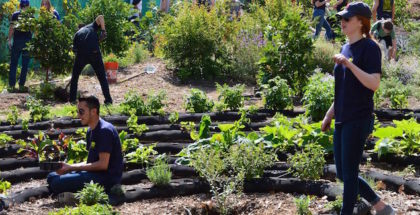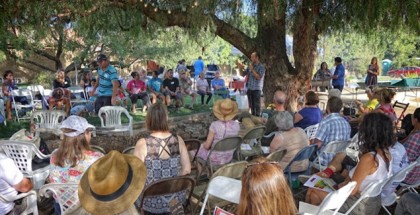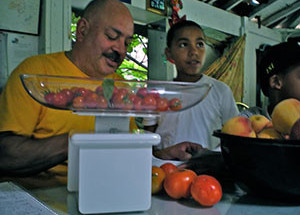Urban Farming
LA Green Grounds Digs in to Build Urban Farms and Strengthen Community
October 24, 2016 | Judith Gerber
LA Green Grounds “Dig-in” in South Los Angeles. Photo courtesy of LA Green Grounds.
In Los Angeles, CA, community members involved in the urban farming and food justice movements are keenly aware of the food insecurity that is so prevalent in its South Los Angeles neighborhoods. It was this insufficient access to healthy, nutritious food that spurred Florence Nishida to co-found LA Green Grounds, a volunteer organization that works with residents of South L.A. to convert their front lawns and parkways into edible landscapes and urban farms.
“If you have a garden in the front yard it leads to conversation, and that’s the most important thing,” says Nishida. “The minute you start growing squash, tomatoes, or something people have never seen before, they start asking questions, and that starts the conversation. Those conversations lead to a sense of community.”
Making vegetables a visible part of the community is what has guided LA Green Grounds ever since its founding in 2010. Read More
Episcopal Diocese Plants Seeds of Hope to Address Food Insecurity in Southern California
September 26, 2016 | Judith Gerber
Tim Alderson, executive director of Seeds of Hope, a food justice ministry that provides universal and affordable access to basic nutrition.
One of the largest diocese in the nation, the Episcopal Diocese of Los Angeles has made food justice a top priority. In 2013, it created Seeds of Hope, a food justice ministry that “provides universal and affordable access to basic nutrition,” says Seeds of Hope Executive Director, Tim Alderson. “In the six California counties that make up the Diocese of Los Angeles, that condition does not exist. Our job is to do what we can to address these issues.”
The idea for Seeds of Hope was conceived when Bishop Jon Bruno was diagnosed with leukemia and admitted for his final treatment at City of Hope. Though not his patient, he met endocrinologist Raynald Samoa, M.D. who was covering rounds. The two men spent over two hours talking about food related illnesses, food access issues and disparities of food health in communites. Dr. Samoa also knew Alderson, who was working on a farm project for City of Hope. Read More
Once the Largest Farming County in US, Los Angeles’s Agricultural Roots Laid Bare in New Book
September 2, 2016 | Karen Briner
Book cover image for “From Cows to Concrete: How Farming Transformed Los Angeles County” © 2016 by Rachel Surls and Judith Gerber, published by Angel City Press. All rights reserved. Image used with permission.
Only a bird’s eye view truly reveals the extent of Los Angeles’s urban sprawl; a city crossed by ribbons of highways supporting unending streams of cars, where even its river is mostly encased in concrete. It’s hard to imagine that this was once a fertile place of such abundance that its name conjured up images of vineyards, orange groves and orchards; in which neighborhoods were better known for their celery than their celebrities. A timely new book, From Cows to Concrete: the Rise and Fall of Farming in Los Angeles, by Rachel Surls and Judith Gerber explores Los Angeles’s past as the agricultural center of North America, tracing its precipitous path as it developed into a concrete metropolis. It’s a cautionary tale that also offers hope for the future in the form of the burgeoning urban farm movement and a renewed interest in community and backyard gardening.
Seedstock recently spoke to co-author, Rachel Surls, Sustainable Food Systems Advisor at the University of California where her job includes overseeing a volunteer program of 300 trained master gardeners who teach local communities sustainable gardening. Read More
It’s Almost Summer in the Urban Garden: Tips for Planting Hot Weather Crops
May 11, 2016 | Khristopher Flack
Zucchini. Source: Wikipedia.
It’s almost summer, and for many that means it’s time to plant the vegetable garden.
Of course, you may have put many of your plants in the ground already, but for those who like to put their vegetable garden in all at once, mid-May is often the time to do it.
The changing climate has complicated this somewhat, so gardeners in northern areas may need to wait until June to put in hot-season crops. This is particularly the case in cities where the city center may experience a several degree differential from surrounding areas. due to an urban heat island effect Check your local USDA zone map to see where you are..
Most summer crops discussed will not tolerate a frost, let alone a freeze, although a blanket on a cold night or row cover will provide a few degrees of protection. Read More
Pro Golfer Leaves Links to Pursue Promise of Greener Urban Farming Pastures
February 25, 2016 | Davina van Buren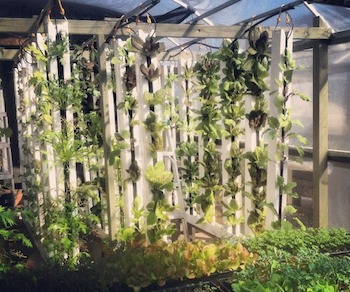
Aquaponic green walls (pictured here) are an integral part of Murietta, CA-based urban farming company, Urban Food Works’ business model. Photo courtesy of Mike Lott.
Mike Lott is not your run of the mill farmer. Not long ago, before making the decision to embark on a career in farming and launch his aquaponic and urban agriculture venture, Urban Food Works in Murietta, CA, Lott was a professional golfer.
As a kid growing up in southern California, he didn’t awake early in the morning to milk and feed cows, harvest crops, or turn the soil. Instead, he honed his golf game in anticipation of one day playing professionally. After high school Lott headed to the College of the Desert in Palm Desert not only because of its well-known golf program, but also to study Environmental Science. It was there that the seeds of Lott’s interest in and current passion for urban farming and the environment were sown. Read More
Urban Farmers at Forefront of Local Agriculture Movement in Riverside
January 25, 2016 | Laura Hurst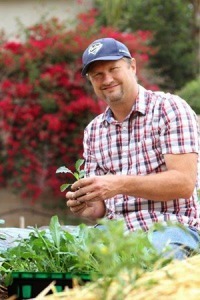
Urban Farmer Scott Berndt of Fox Farm with his produce. Photo courtesy of Scott Berndt.
Scott Berndt first moved to California to start a career in hotel and restaurant management. But having spent his childhood on a farm in South Dakota and hailing from a multi-generation family of farmers, he soon embarked on a side project: growing tomatoes.
In the early days of Fox Farm, Scott Berndt packed 300 tomato plants into his backyard in Riverside, CA, seeding them and then selling the young plants at an annual plant sale.
In 2014, Berndt’s real estate agent visited his home and asked about the crop of plants in the backyard. When Berndt told her what he was doing, and that he wished for more space, she offered the two and a half acres behind her home as a growing plot, so long as he did not use chemicals or toxins. Since Berndt was already using organic methods, and continued doing so with the flowers he cultivated on her land, it was a perfect fit. A year later, he converted an unused horse corral as additional growing space for vegetables, and Fox Farm was born. Read More
Urban Farming Program at Indiana High School Teaches Students to Farm and Embrace Entrepreneurship
January 20, 2016 | AJ Hughes
A student at Thea Bowman Leadership Academy handles chickens inside their coop at the school’s farm. (Photo courtesy Lynda Bodie/Thea Bowman Leadership Academy)
Gary, Indiana, known for being the birthplace of Michael Jackson and home to massive steel plants, now has a high school with an urban farm program.
Last year, students at Thea Bowman Leadership Academy in Gary started the urban farm. It’s founded and operated under the principles of a business plan written as part of an entrepreneurship and personal finance class curriculum. Read More
New Data Collection Toolkit Allows Urban Farmers to Measure Progress
January 5, 2016 | Anne CraigUrban farmers and gardeners now have a brand new way to measure their results and gather hard data thanks to the Farming Concrete Data Collection Tool Kit.
The project originated in New York City in 2009 as a collaborative venture between nonprofits Added Value Farms and the Design Trust for Public Space. The data collection tools are intended to help individual farmers quantify what they are doing in ways that will help them both improve and promote their farms. Read More


